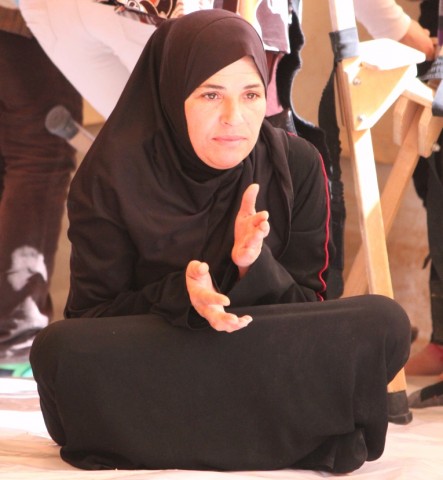Circus mom negotiates with parents and encourages girls to exercise
When visiting the circus tent at Zaatr refugee camp, Jordan’s largest refugee camp, one can’t help but bump into Mariam Omar Guzlani, dressed in black scarf and loose-fitted dress.
On most weekdays, the mother of six is attending the girls’ circus practices, where her two daughters, Salaam, 13, and Ahd, 17, are also participating. She’s also practicing juggling and acrobatics along with the girls.
The delicate 40-year-old woman says she has a history competing in boxing and martial arts before starting up a family.
Her son, Mohammad Qusam Guzlan, is one of the group leaders for the boys’ circus group.
“Circus has helped all of us to adapt”, she says.
Guzlan has noticed that the emotional well-being of children has improved after they started participating in the classes.
“Exercise is important, because it helps release energy in a good way.”
Finn Church Aid started humanitarian work at Zaatr camp in the autumn of 2012. FCA’s employees quickly got an idea that circus school could offer children a place where they can release some of the stress caused by traumatising effects of the war and being a refugee.
Every weekday, about 35 Syrian men and 20 women practice circus tricks in the tents provided by FCA at the 4th district of Zaatr refugee camp.
The target group for FCA’s work is 15 to 24 year olds.
Stress release and better behaviour
Mariam Guzlan and her family are from Daael village in Daraa, southern Syria. They had to flee the war to Jordan and have been living at Zaatr camp in northern Jordan for a year and eight months.
Many refugees living at Zaatr are from South Syria’s rural region, and are not as educated as Syrians in large cities. Many have conservative views for example on what is appropriate for girls. Some view exercise or circus as not suitable hobbies for girls.
Guzlan says that sometimes she has to persuade the parents to let their daughter join circus classes. She tells them that exercise is ideal for stress release and can improve their children’s behaviour and make them happier.
She also admits that life at refugee camp is exhausting. Constant worry for the future and for the relatives left behind at Syria haunts her. When arriving in Jordan, Syrians thought they’d be able to return home in few months. Now those months have turned into years.
Guzlan, who worked as a nurse in Syria, says there’s a shortage of medicine for the refugees, and that they miss their native foods and climate.
Zaatr camp is located in the desert, which is blistering hot in the summer and freezing in the winter.
Guzlan says she visited her family’s farm in Syria a year ago to find out if they could return. But the fighting continues, and her home had been destroyed.
“We are still waiting for the moment we can return to Syria”, she sighs.
Perhaps daughter Salaam could establish a circus or a circus school at home, she ponders.
Text: Terhi Kinnunen
